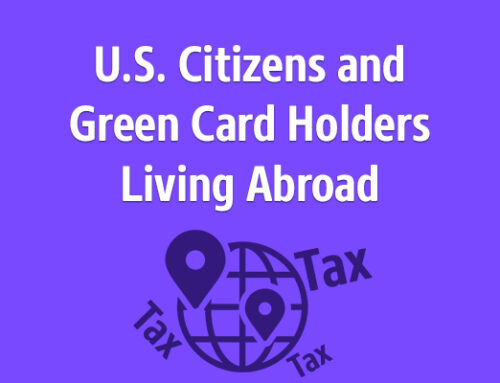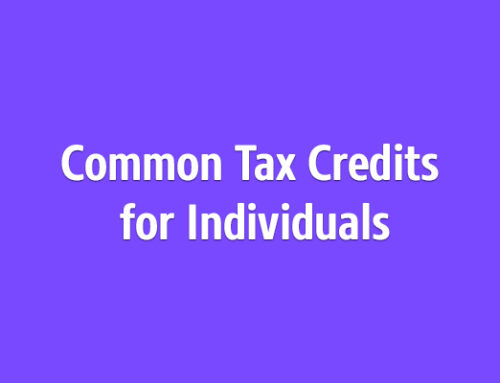Even though we are in the middle of the tax season, some of you may still haven’t received all your tax forms yet. You must make sure to receive all your forms before filing your tax return. If you do not include income statements, this will cause an IRS audit and you may owe additional taxes. If you do not include expense statements in your tax return, this may result in less deduction therefore more tax liability.
In some cases, you may not be familiar with certain tax forms you receive, and you may miss including those in your tax return. Here is the list of common tax forms to expect before filing your taxes.
Forms to Report Your Income
W-2
Form W-2 is wage and tax statement, it is filed by employers to report wages, tips, and other compensation paid to employees as well as FICA and withheld income taxes.
W-2C
Form W-2c is the correction form of previously filed wage and tax statement (Form W-2 or W-2C). Any errors made on Form W-2 or W-2C filed previously, is corrected in this form.
W-2G
Form W-2G is for certain gambling winnings, it is filed to report gambling winnings and any federal income tax withheld on those winnings.
1099-NEC
Form 1099-NEC is to report nonemployee compensation ($600 or more). If you are a gig worker or worked as a sub-contractor expect to receive this form.
1099-MISC
Form 1099-MISC is used to report rents, royalties, prizes and awards and other fixed determinable income.
1099-G
Form 1099-G is used to report certain government payments. The most common use of the 1099-G is to report unemployment compensation or any state or local income tax refunds you received that year.
1099-K
Form 1099-K is used to report payments made by payment settlement entity (PSE). Payment settlement entities must file Form 1099-K for payments made in settlement of reportable payment transactions for each calendar year.
Common types of payments reported with form 1099-K are credit cards, debit cards, PayPal, Uber, Lyft, Amazon, Ebay, Etsy, and other third-party payers. This usually relates to any electronic sales transactions.
1099-INT
Form 1099-INT is used by payers such as banks, mutual funds, savings institutions, government entities, and other financial centers that report to the IRS regarding the interest paid to recipients.
Expect to receive form 1099-INT if you received at least $10 interest, received credit card cash bonuses, paid foreign taxes or federal income taxes under backup withholding.
1099-DIV
Form 1099-DIV is used to report dividends (including capital gain dividends and exempt-interest dividends) and other distributions on stock of $10 or more during the tax year. You may receive multiple 1099-DIVs and all of those should be reported in your tax return.
1099-C
Form 1099-C is to report cancellation of debts of over $600 that were forgiven or canceled during the tax year. This form is issued by creditors to report the debt amount cancelled for the debtors.
1099-B
Form 1099-B is filed by broker or barter exchange to report proceeds from broker and barter exchange transactions. This form lists the gain or loss for each person for whom they sold (including short sales) stocks, bonds, commodities, mutual funds, securities futures contracts,
1099-Q
Form 1099-Q is filed to report payments from qualified education programs
1099-S
Form 1099-S is used to report proceeds from real estate transactions
1099-SA
Form 1099-SA is used to report distributions from an HSA, Archer MSA, or Medicare Advantage MSA
1099-R
Form 1099-R is used to report Distributions from Pensions, Annuities, Retirement or Profit-Sharing Plans, IRAs, Insurance Contracts, etc.
Schedule K-1
Schedule K-1 is used to report share of income, deductions, credits, etc. Expect to receive Schedule K-1 if you’re partner of a partnership that files 1065, a beneficiary on 1041, or shareholder of an S corporation that files 1120-S.
You must report Schedule K-1 on your Form 1040 or 1040-NR, U.S. Individual Income Tax Return.
Schedule K-2
Schedule K-2 is a new tax form and it is used to report Distributive Share Items-International for tax relevance from the operation of a partnership or S corporation. It’s filed with form 1065, form 1120-S and form 8865.
Schedule K-3
Schedule K-3 is a new tax form and it is used to report Share of Income, Deductions, Credits, etc.-International tax relevance from the operation of a partnership or S corporation. It’s an extension of Schedule K-1 and filed with form 1065, form 1120-S and form 8865.
Forms to Report Your Expenses
1098-E
Form 1098-E is Student Loan Interest Statement if you paid student loan interest of $600 or more during the year.
1098-T
Form 1098-T is tuition statement is used by eligible educational institutions to report for each student the enrolled amounts they received for qualified tuition and related expense payments including tuition, fees, and course materials.
1098
Form 1098 Mortgage Interest Statement is used to report mortgage interest (including points) of $600 or more you paid during the year in the course of your trade or business.
Health Insurance Statements
1095-A
Form 1095-A Health Insurance Marketplace Statement is used to report information to the IRS about individuals who enroll in a qualified health plan through the Marketplace.
You can file premium tax credit, to reconcile the credit on your returns with advance payments of the premium tax credit (advance credit payments), and to file an accurate tax return.
1095-B
Form 1095-B is used by all persons who provide minimum essential health coverage to file returns reporting information for each individual for whom they provide minimum essential coverage.
1095-C
Form 1095-C Employer-Provided Health Insurance Offer and Coverage is used by applicable large employers (as defined in section 4980H(c)(2)) to verify employer-sponsored health coverage and to administer the shared employer responsibility provisions of section 4980H.
References;
IRS Publications, Forms and Instructions
https://www.irs.gov
Disclaimer
This article is intended for informational purposes and should not be taken as legal or tax advice. You must consult with your tax, financial or legal adviser about your unique financial situation before acting on anything discussed in this article. TaxBasket LLC is providing informational content for general guidance to help small business owners become more aware of certain issues and topics and this article must never be considered as a substitute for advice provided by your tax, financial or legal advisers. TaxBasket LLC or its members cannot be held liable for any use or misuse of this content.




